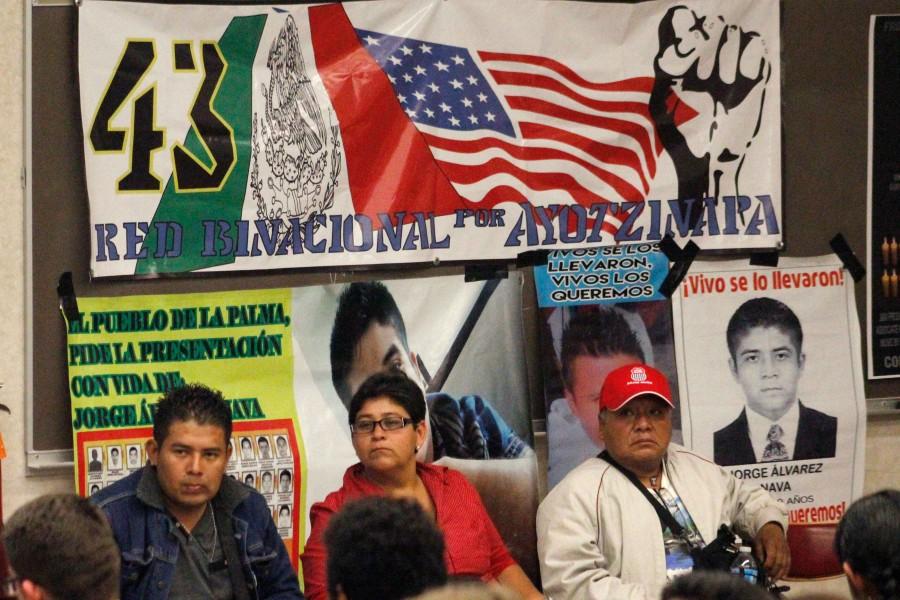A large black-and-white picture of Jorge Alvarez Nava, a 19 year old and one the 43 missing students from Ayotzinapa, hangs from a wall. Strewn atop the picture, written in bold red letters is, “¡Vivos se lo llevaron! ¡Vivos lo queremos!” (Alive they took them! Alive we want them back!)
Beside his picture are two pictures of his classmates, they are like him–young, students from Ayotzinapa Rural Teachers College, who went missing on Sept. 26, 2014 in the city of Iguala, Guerrero. The students were headed there to protest in favor of education reforms when their bus was attacked.
Seated in front of the pictures are two parents of the missing students and a brother of one of the surviving students. They form part of a national speaking tour, who are traveling around the U.S. in order to ask for solidarity and support for the missing Ayotzinapa students.
They asked the 100-plus UTEP students, who filled the seats and lined the walls of the auditorium, to inform the general public about the issue, send letters to U.S. representatives to stop sending monetary aid to Mexico, and for people eligible to vote in Mexico, not to vote.
“Es de esa manera que nosotros vinimos a solicitarles el apoyo, a parte de darles a conocer la verdadera historia que nosotros estamos viviendo como estudiantes,” (It’s in this manner that we ask for your help, apart from letting you know the true story) said Josimar De la Cruz Ayala, whose brother, Ángel Nedri De La Cruz, was one of the survivors of the attack.
Family members stated that many of the students survived the attack, three students died, three sustained critical injuries, including one who is in a coma, and 43 are missing.
“El gobierno Mexicano se esta lavando las manos hacienda creer que es un crimen de narcotraficante,” (The Mexican government is washing its hands by making people believe it was drug gangs that took them) Ayala said.
Other reports state that it was Mexican army who attacked the students, killed six students, wounded 25 and kidnapped 43.
“Ya vamos para seis meses y no sabemos nada de nuestro hijo,” (It’s been six months and we don’t know anything about our son) said Blanca Luz Nava Vélez, mother of missing student Jorge Álvarez Nava. “Nosotros queremos a nuestros hijos.” (We want our sons)
According to the parents and the brother, the Mexican government was involved in the disappearance of the students.
“El gobierno nos a estado engañando. Todo es mentira,” (The Mexican government has been lying to us. It is all a lie) said Estanislao Mendoza Chocolate, father of Miguel Ángel Mendoza Zacarías.
Chocolate was referring to a report released by the Argentine Forensic Anthropology Team (EAAF), a non-governmental, non-profit forensic team, which declared that the 23 of 30 humans remains analyzed by team did not match biological kinship of the 43 students.
The Argentinian forensic team analyzed remains from the Cocula dump, the place where the remains of the students were presumed to be. The findings by the team countered an investigation by the Procaduria General de la Rupublica (PGR), which had concluded that the students were assassinated and incinerated by the criminal drug-trafficking group Guerreros Unidos.
Parents still await the results on the rest of the remains.
The report also criticized the Mexican government for closing the case of the missing Ayotzinapa students, mistakes made throughout the investigation such as leaving the dump in Cocula unguarded, and ignoring proof that the remains don’t match the students, among others.
“Tenemos que encontrar la verdad, y para eso necesitamos su ayuda,” (We need to find the truth, and for that we need your help) said Velez.
The family members present also said that the local government has offered them money to stop protesting, specifically the governor. They said these offerings were made over the phone.
“A ofrecido muchísimo dinero, casas, o transporte para los padres de familia para así quedarse callados,” (They have offered a lot of money, houses and transportation so they stay silent,) said Ayala. “Vamos a segir adelante hasta encontrar justicia.” (We will keep going until we find justice)
Family members also expressed opposition to Plan Merida, formerly known as the Merida Initiative, a partnership between the U.S and Mexico to fight organized crime and violence. According to the U.S Department of State, the U.S. Congress has appropriated $2.3 billion since the Merida Initiative began in fiscal year 2008.
“It seems like a good plan…but it is not. It’s used to train federal forces of a corrupt government. The government uses these funds to oppress civilians, to oppress activists and not to control organized crime,” said Selfa Chew, visiting assistant professor of history.
The parents will continue to tour throughout the U.S, and El Paso was one of the stops among 30 cities they plan to visit.
“Te vamos a encontrar mijo,” (We are going to find you son) Vélez said.
Maria Esquinca may be reached at [email protected].







